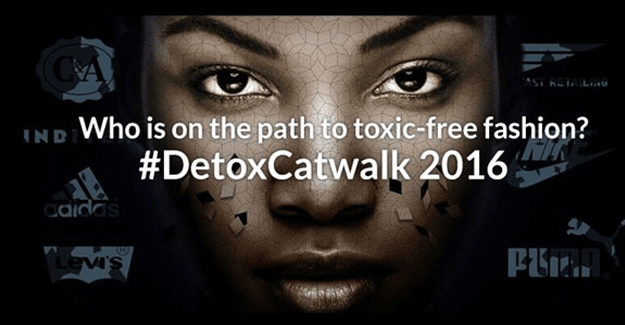
Greenpeace 2016 Detox Catwalk Report Names H&M, Benetton, Inditex As Avante Gardes
Greenpeace International has released its 2016 Detox Catwalk report, highlighting the progress made by international brands towards becoming environmentally safe.
The 2016 Detox Catwalk finds that a few companies are ahead of the curve and on track to meet their commitments - these three are Avant-Garde. The majority- twelve-of the Detox committed brands are still in Evolution Mode - and need to improve their performance in at least two of the three key assessment criteria. Finally, four brands are taking a Faux Pas-by not yet accepting individual responsibility for their hazardous chemical pollution and implementing the urgent steps needed to achieve the goal of eliminating hazardous chemicals by 2020.
Inditex, Benetton and H&M have been ranked Avante Garde. Brands in Evolution Mode include C&A, Fast Retailing, G-Star, Mango, Miroglio, Valentino, Adidas, Burberry, Levi's, Primark, Puma, M&S. And companies that had committed to detox but are now heading in the wrong direction, according to the report, include Esprit, Limited Brands, Li-Ning and Nike. And the Toxic Addicts include Armani, Bestseller Diesel, D&G, Gap, Hermes, LVMH Group, Christian Dior Couture, Metersbonwe, PVH, VAncl and Versace.
There are three criteria on the issue of hazardous chemicals:
1. Detox 2020 plan - a system for eliminating hazardous chemicals that is proactive and precautionary
2. PFC elimination - substituting hazardous PFCs with safer alternatives
3. Transparency - disclosing information on suppliers and the hazardous chemicals they discharge.
The Avante Gardes
According to Greenpeace, Inditex's approach to transparency is exemplary: it has ensured that its suppliers publish their data on the discharge of hazardous chemicals in wastewater; it has published a list of its wet process suppliers; investigated the presence of hazardous chemicals across its supply chain including an analysis of trends across regions; and has a root causes programme to determine the source of hazardous chemicals when they occur.
Inditex has a comprehensive and well explained Detox 2020 plan that embeds a "clean factory approach" for the elimination and phase-out of its extensive 'list' of hazardous chemical groups, including their regular monitoring in wastewater before treatment.
Inditex uses its leverage with its wet processing supply chain as well as engaging with chemical suppliers, ranking factories and chemical products on performance. It has delivered on its commitment on PFC elimination within its timeline which is documented in case studies.
Benetton delivers on its commitment to eliminate PFCs, and has published its investigation into its products and supply chain processes.
The company ensures that alternatives are tested against hazard criteria. Benetton continues to make good progress towards its' longer term goal on transparency and provides information on its monitoring of wastewater discharges, publishing full details of the suppliers that were tested.
Benetton has developed a positive Detox 2020 plan to enforce its ban on hazardous chemicals through a 'clean factory' approach, which it applies to the suppliers' whole factory - not just to Benetton's own production lines. To be more rigorous Benetton needs to show that it is applying a hazard-based screening method for hazardous chemicals and ensure it is updated regularly.
H&M has a regularly updated Detox 2020 plan which includes hazardous chemicals beyond the initial 11 groups, that is based on a transparent hazard screening method and uses the lowest detection limits. Its programme is applied using a Clean Factory approach to enforce its targets, by ensuring that suppliers apply Detox across their whole mill, not only for the brand's products.
H&M was the first brand to eliminate the hazardous chemicals PFCs from its products but it still needs to deliver on its commitment to publish a case study which documents this, to help expedite the elimination of PFCs by other brands and through regulation.
It continues to deliver on transparency and needs to bring its commitment up to date by aiming to increase the percentage of suppliers reporting their Detox data online to 80% of its global wet process suppliers, with the priority in China, says the Greenpeace report.
Textile Excellence
If you wish to Subscribe to Textile Excellence Print Edition, kindly fill in the below form and we shall get back to you with details.












